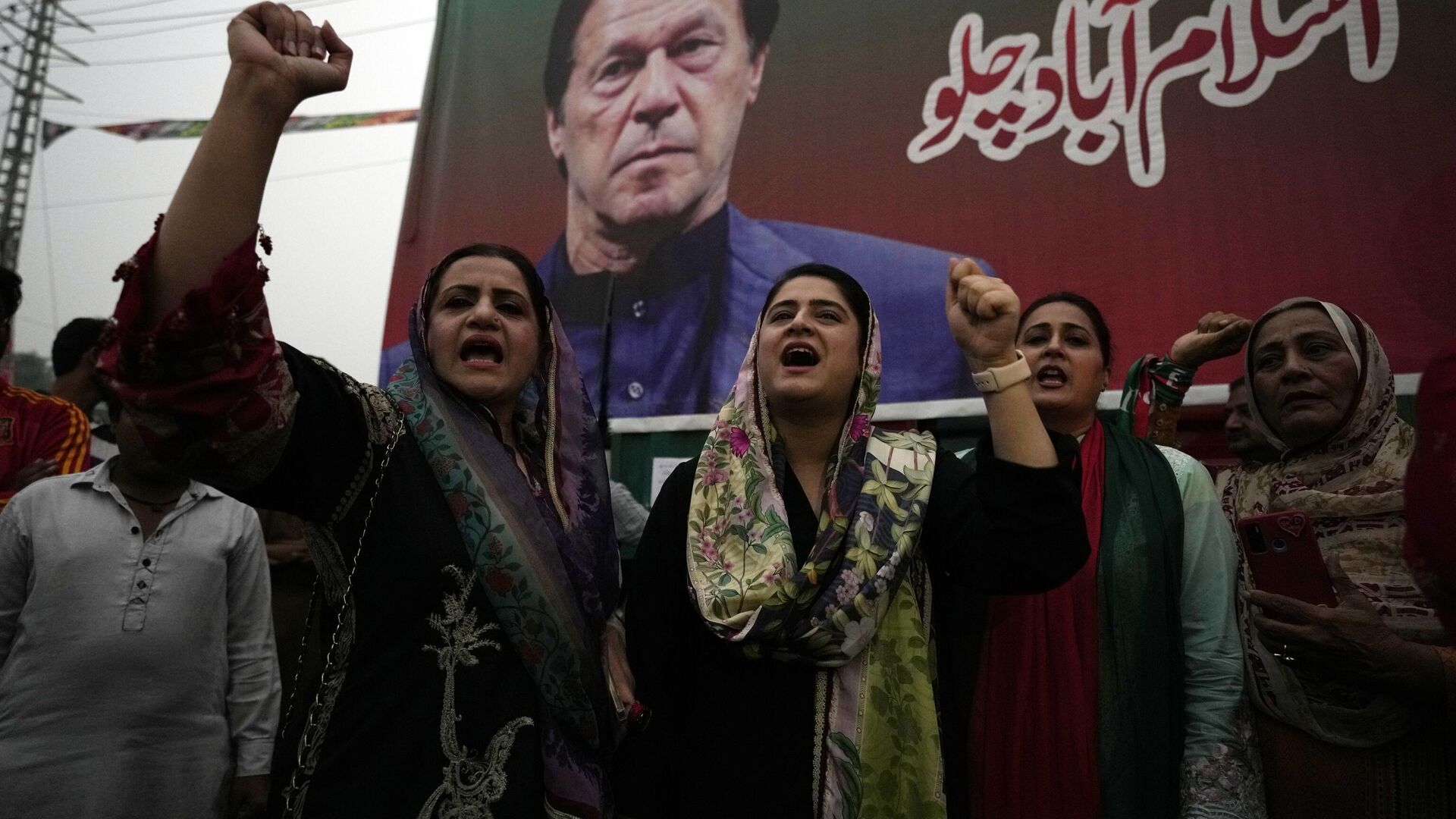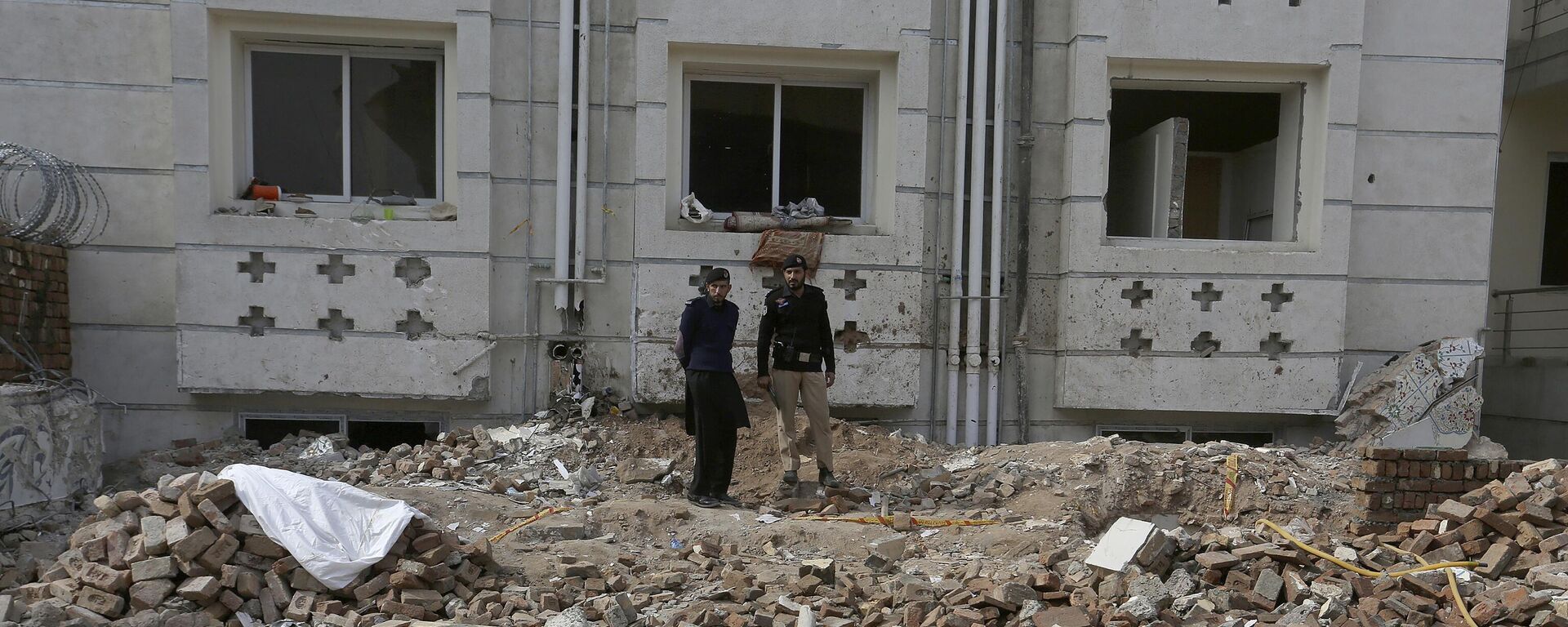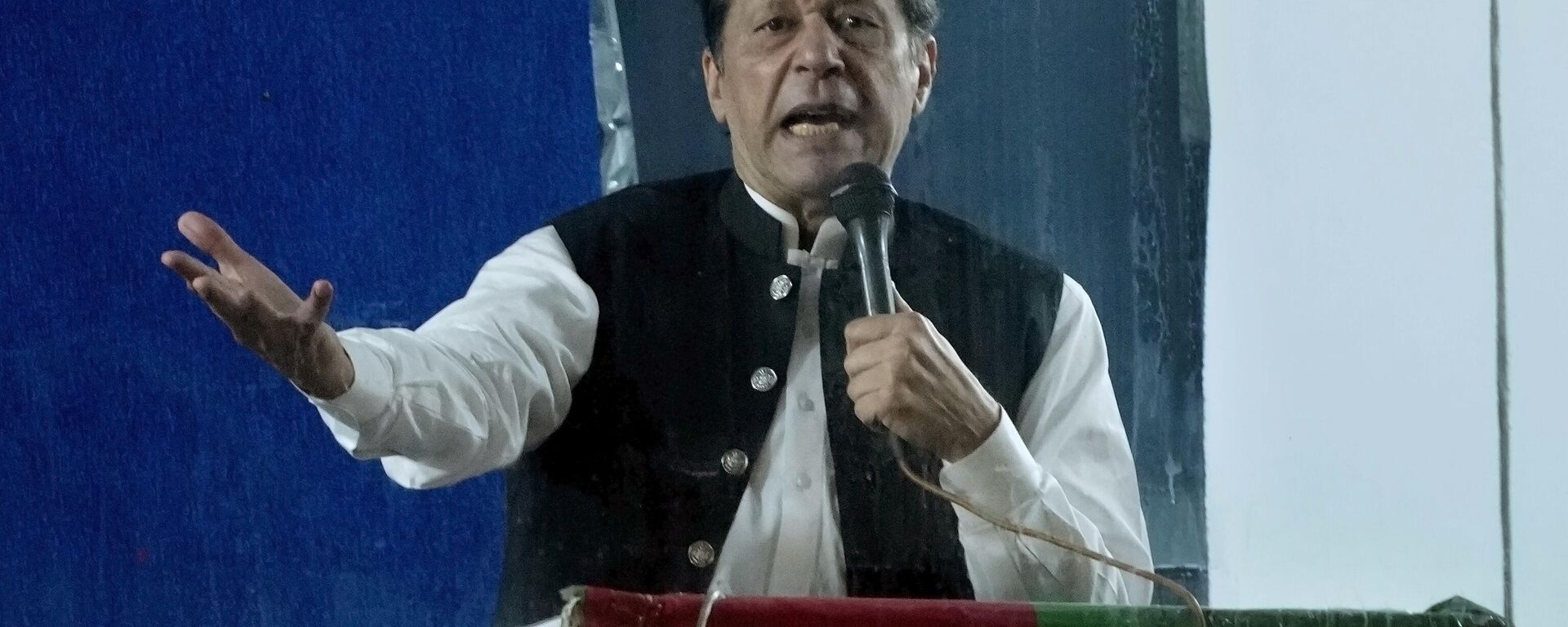https://sputniknews.in/20230427/amid-constitutional-tumult-in-pakistan-imran-khan-warns-of-national-demands-for-elections-1714441.html
Amid Constitutional Tumult in Pakistan, Imran Khan Warns of National Demands for Elections
Amid Constitutional Tumult in Pakistan, Imran Khan Warns of National Demands for Elections
Sputnik India
The Supreme Court of Pakistan has declared 14 May as the date for holding two provincial elections in the country, but Shehbaz Sharif's government objects to... 27.04.2023, Sputnik India
2023-04-27T18:26+0530
2023-04-27T18:26+0530
2023-04-27T18:26+0530
pakistan
south asia
imran khan
shehbaz sharif
elections
sit-in protest
protests
imf loan
constitution
economic crisis
https://cdn1.img.sputniknews.in/img/07e7/03/0f/1167815_0:160:3073:1888_1920x0_80_0_0_2731f156c18a2d1d23ddd643ad5a15b4.jpg
The recent verdict to hold elections in Punjab and Khyber Pakhtunkhwa was issued by a three-member bench headed by Chief Justice of Pakistan (CJP) Umar Ata Bandial who was joined by Justices Munib Akhtar and Ijaz ul Ahsan.The decision to hold these polls in May came after Imran Khan, the former prime minister and chief of Pakistan's Tehreek-e-Insaf party (PTI) [Pakistan Movement for Justice], dissolved the assemblies of Punjab and Khyber Pakhtunkhwa where his party held the majority votes. His move followed the Shehbaz Sharif government's decision to postpone the elections, despite PTI's nationwide protests which have been going on for more than a year.By law, as set down in the country's constitution, after an assembly has been dissolved, elections must take place within 90 days. Hence, after the PTI appealed to the Supreme Court, the decision to hold provincial elections on 14 May was made by the chief justice.The Supreme Court's ruling was a major setback to the Shehbaz Sharif government, which has been trying to postpone elections to the Punjab assembly. Earlier, the Election Commission of Pakistan (ECP) decided to put off polls to the Punjab Assembly until 8 October. However, the Supreme Court ruled that it was "unconstitutional" to delay the elections for more than 90 days.The court's decision did not go down well with the present government. The government lawmakers moved to pass a Bill to block the top judges' powers on taking "suo-moto" notice – which means acting on its own behest in the nation's interest without a plaintiff issuing a writ.The Bill is now in limbo after it was suspended last week by an eight-member top court panel, a week before it was expected to become law. This suspension brought about a clash between Chief Justice of Pakistan (CJP) Umar Ata Bandial and the government, with a formal hearing due to begin on 2 May on whether the Bill is constitutional.Escalated Constitutional CrisisPakistan descended into this turbulent state after Imran Khan was ousted from power a year ago by Prime Minister Shehbaz Sharif and an alliance of 13 political parties. Since then, Khan, who remains the most popular leader in the country as shown by the polls, has been holding nationwide, peaceful protests and sit-ins demanding fresh elections so that people can decide who they want in power. Khan feels confident that he and his party will have a sweeping win.During one such gathering Khan faced an assassination attempt when he and his party members were shot at. His leg received several bullet wounds and he was quickly hospitalized. After surgery in Shaukat Khanum hospital in Lahore, he spent weeks in a wheelchair, but that did not deter him from addressing the nation and continuing to demand the government hold snap elections.Meanwhile, Prime Minister Sharif has criticised the Supreme Court's decision to hold elections on 14 May. On Wednesday, he said that coalition partners have unanimously decided that the elections should be held in October-November across the country on the same day. He made the statement after holding a long meeting with other high-ranking members of the government.The prime minister earlier had said that the lack of funds was one of the reasons Pakistan cannot hold elections right now. Sharif said that the country must focus on securing the much-needed loan from the International Monetary Fund (IMF) and introduce the measures that the IMF has insisted on to unlock the fund's loan and stabilise Pakistan's economy.However, Justice Bandial ordered the nation’s Central Bank to provide funds to the Election Commission to carry out the polls, after the government refused to make the finances available. Earlier in April, the Shehbaz administration was ordered to provide 21Bln rupees ($74Mln) to the election body by 10 April, to carry out the polls, which it did not.According to some analysts, the government may be charged with contempt of court if it disobeys the orders given directly by the chief justice.Khan Warns of Call for Nationwide ProtestsAmid all the political drama that is currently unfolding in Pakistan, the former prime minister Imran Khan has said that if the government disobeys the Supreme Court's orders concerning elections in Punjab, he will "bring the nation out on the streets".The former premier added that he can summon [the workers] to prepare the nation [for protests] at any time as his party stood for rule of law and justice, stressing that his struggle for "true freedom" was in fact his fight to make "everyone obey the law"."Society becomes free only through justice and the provision of rights," he said.After the repeated series of recriminations being levelled by the main political parties against each other for the past few weeks, the Supreme Court afforded a temporary respite giving them time until 26 April to develop a consensus on the date for elections to the provincial and national assemblies, so they could be held simultaneously across the country. The Supreme Court will resume the hearing from today, 27 April 2023.
https://sputniknews.in/20230424/pakistans-economic-crisis-drives-rising-gun-culture-and-criminal-violence-1668905.html
https://sputniknews.in/20230327/imran-khan-lays-out-road-to-pakistans-economic-recovery-1321236.html
pakistan
south asia
Sputnik India
feedback.hindi@sputniknews.com
+74956456601
MIA „Rossiya Segodnya“
2023
Aneela Rashid
https://cdn1.img.sputniknews.in/img/07e6/0c/0d/74548_0:0:485:484_100x100_80_0_0_821526e967ae85d041e2d30ee34fa1de.jpg
Aneela Rashid
https://cdn1.img.sputniknews.in/img/07e6/0c/0d/74548_0:0:485:484_100x100_80_0_0_821526e967ae85d041e2d30ee34fa1de.jpg
News
en_IN
Sputnik India
feedback.hindi@sputniknews.com
+74956456601
MIA „Rossiya Segodnya“
Sputnik India
feedback.hindi@sputniknews.com
+74956456601
MIA „Rossiya Segodnya“
Aneela Rashid
https://cdn1.img.sputniknews.in/img/07e6/0c/0d/74548_0:0:485:484_100x100_80_0_0_821526e967ae85d041e2d30ee34fa1de.jpg
pakistan, south asia, imran khan, shehbaz sharif, elections, sit-in protest, protests, imf loan, constitution, economic crisis
pakistan, south asia, imran khan, shehbaz sharif, elections, sit-in protest, protests, imf loan, constitution, economic crisis
Amid Constitutional Tumult in Pakistan, Imran Khan Warns of National Demands for Elections
The Supreme Court of Pakistan has declared 14 May as the date for holding two provincial elections in the country, but Shehbaz Sharif's government objects to same-day polls and has rejected the court's order for provincial elections. However, Imran Khan has warned that his supporters will protest if the government disobeys the court's orders.
The recent verdict to hold elections in Punjab and Khyber Pakhtunkhwa was issued by a three-member bench headed by Chief Justice of Pakistan (CJP) Umar Ata Bandial who was joined by Justices Munib Akhtar and Ijaz ul Ahsan.
The decision to hold these polls in May came after Imran Khan, the former prime minister and chief of Pakistan's Tehreek-e-Insaf party (PTI) [Pakistan Movement for Justice], dissolved the assemblies of Punjab and Khyber Pakhtunkhwa where his party held the majority votes. His move followed the Shehbaz Sharif government's decision to postpone the elections, despite PTI's nationwide protests which have been going on for more than a year.
By law, as set down in the country's constitution, after an assembly has been dissolved, elections must take place within 90 days. Hence, after the PTI appealed to the Supreme Court, the decision to hold provincial elections on 14 May was made by the chief justice.
The Supreme Court's ruling was a major setback to the Shehbaz Sharif government, which has been trying to postpone elections to the Punjab assembly. Earlier, the Election Commission of Pakistan (ECP) decided to put off polls to the Punjab Assembly until 8 October. However, the Supreme Court ruled that it was "unconstitutional" to delay the elections for more than 90 days.
The court's decision did not go down well with the present government. The government lawmakers moved to pass a Bill to block the top judges' powers on taking "suo-moto" notice – which means acting on its own behest in the nation's interest without a plaintiff issuing a writ.
The Bill is now in limbo after it was suspended last week by an eight-member top court panel, a week before it was expected to become law. This suspension brought about a clash between Chief Justice of Pakistan (CJP) Umar Ata Bandial and the government, with a formal hearing due to begin on 2 May on whether the Bill is constitutional.
Escalated Constitutional Crisis
Pakistan descended into this turbulent state after Imran Khan was ousted from power a year ago by Prime Minister Shehbaz Sharif and an alliance of 13 political parties. Since then, Khan, who remains the most popular leader in the country as shown by the polls, has been holding nationwide, peaceful protests and sit-ins demanding fresh elections so that people can decide who they want in power. Khan feels confident that he and his party will have a sweeping win.
During one such gathering Khan faced an assassination attempt when he and his party members were shot at. His leg received several bullet wounds and he was quickly hospitalized. After surgery in Shaukat Khanum hospital in Lahore, he spent weeks in a wheelchair, but that did not deter him from addressing the nation and continuing to demand the government hold snap elections.
Meanwhile, Prime Minister Sharif has criticised the Supreme Court's decision to hold elections on 14 May. On Wednesday, he said that coalition partners have unanimously decided that the elections should be held in October-November across the country on the same day. He made the statement after holding a long meeting with other high-ranking members of the government.
The prime minister earlier had said that the lack of funds was one of the reasons Pakistan cannot hold elections right now. Sharif said that the country must focus on securing the much-needed loan from the International Monetary Fund (IMF) and introduce the measures that the IMF has insisted on to unlock the fund's loan and stabilise Pakistan's economy.
However, Justice Bandial ordered the nation’s Central Bank to provide funds to the Election Commission to carry out the polls, after the government refused to make the finances available. Earlier in April, the Shehbaz administration was ordered to provide 21Bln rupees ($74Mln) to the election body by 10 April, to carry out the polls, which it did not.
According to some analysts, the government may be charged with contempt of court if it disobeys the orders given directly by the chief justice.
Khan Warns of Call for Nationwide Protests
Amid all the political drama that is currently unfolding in Pakistan, the former prime minister Imran Khan has said that if the government disobeys the Supreme Court's orders concerning elections in Punjab, he will "bring the nation out on the streets".
Khan shared his concern saying that it is quite likely that the government would defy court orders. "If this happens," he said, "then I will bring the nation out onto the streets as our struggle is to establish the rule of law in our country."
The former premier added that he can summon [the workers] to prepare the nation [for protests] at any time as his party stood for rule of law and justice, stressing that his struggle for "true freedom" was in fact his fight to make "everyone obey the law".
"Society becomes free only through justice and the provision of rights," he said.
The PTI chief said that to pull the country out of the crisis, "the justice system will have to be amended". Earlier, Khan had repeatedly said that the only way forward for the country is through new and fair elections.
After the repeated series of recriminations being levelled by the main political parties against each other for the past few weeks, the Supreme Court afforded a temporary respite giving them time until 26 April to develop a consensus on the date for elections to the provincial and national assemblies, so they could be held simultaneously across the country. The Supreme Court will resume the hearing from today, 27 April 2023.




